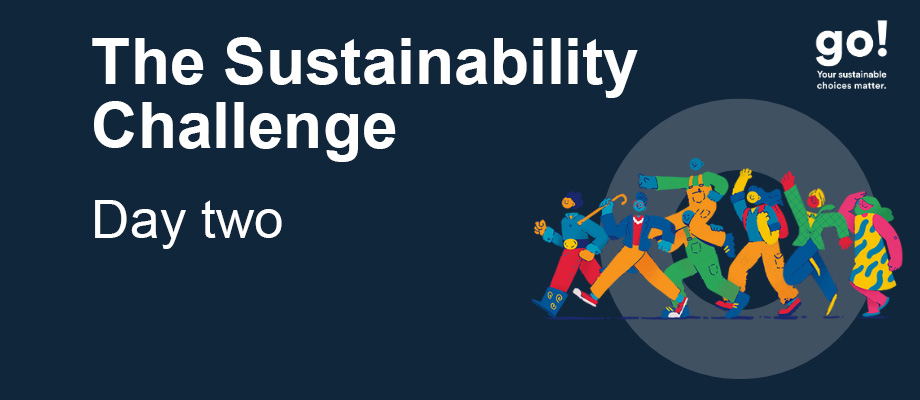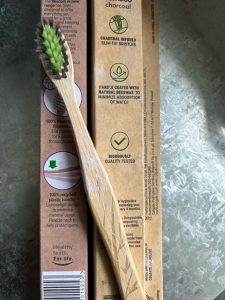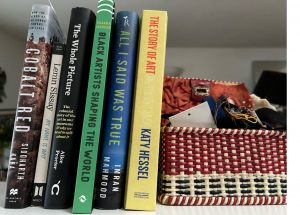
March 19, 2024, by Ryan Neal
The Sustainability Challenge 2024 – Day Two
The Sustainability Challenge – part of Sustainability Action Week – sees us invite some of our senior leaders to spend the week living as sustainably as possible. It gives them the opportunity to reflect on their experience and share their thoughts with our community. This year our chancellor, Baroness Lola Young, has taken on the challenge. Read on to find out how she got on – if you’re just joining us, you can catch up on day one here.
Day two – we need to talk about toothbrushes
As a result of my day job, I like to think I’m pretty aware of what’s going on. Nonetheless, I’m always happy to learn something new, as I did when a year or so ago a colleague mentioned the problem with toothbrushes. The knowledge that a billion plastic toothbrushes were being discarded in the US alone was horrifying. Images of brightly coloured sea creatures, turned out to be photos of used toothbrushes. The end of the line for a plastic toothbrush is either in landfill, an incinerator or in the ocean…
For people of my generation in the 1950s, we were led to believe that plastic was quite the thing—modern, attractive, light, efficient and durable. I have a sewing box given to me when I was 11 years old: the satin interior is in shreds but the red and white plastic exterior is still in good condition (and still in use), six decades later. Plastic was an essential component of the new modern age of technology until it wasn’t. It became synonymous with the tacky, the artificial and the synthetic. Now, plastic has achieved pariah status as we belatedly attempt to banish it from our lives, even as we continue to produce more of the evil substance. The picture is a lot more complicated than I’ve characterised it here of course, but I’m glad to see that more people understand the role of toothbrushes in adding further misery to the biosphere and that there are now several more eco-friendly alternatives available.
 Which is just as well: I’d thought I was okay with my electric toothbrush but that stopped working and is, of course a non-biodegradable nightmare to dispose of. It’s still in my bathroom, lurking there as a reminder of how easy it is to adopt, and cling to bad habits. Anyway, I popped a couple of bamboo brushes in with my vegan chorizo at my local supermarket, and I’m enjoying my charcoal fresh clean teeth!
Which is just as well: I’d thought I was okay with my electric toothbrush but that stopped working and is, of course a non-biodegradable nightmare to dispose of. It’s still in my bathroom, lurking there as a reminder of how easy it is to adopt, and cling to bad habits. Anyway, I popped a couple of bamboo brushes in with my vegan chorizo at my local supermarket, and I’m enjoying my charcoal fresh clean teeth!
I’ve just started listening to the fiction audiobook, The Ministry for the Future by Kim Stanley Robinson. I’m not quite sure how I feel about it yet, so no spoiler alerts are needed. I’m on chapter 45 but I was struck by an earlier, brief section comprising a discussion/analysis of efficiency, that referred to something called Jevon’s Paradox. Those of you who’ve studied economics may already see the connection between Jevon and sustainability, but I didn’t know the text, so I asked Professor Google and got the explanation I sought.
And no, I’m not going to explain what it’s all about—if you really want to know, follow the references yourself! In summary, as I understand it, the point is that practices and mechanisms may be labelled efficient, but that doesn’t mean that they are necessarily good for people and planet. The paradox bit is that technological developments that make production of a resource more efficient by lowering the cost, can lead to inefficiency due to overuse, depletion and pollution. Coal is a prime example: the more efficiently it’s produced, the more we use it, so more is produced and so…well you don’t need me to explain what the extraction and burning of coal has done for planet Earth and its inhabitants.
Talk ing of books—talking or otherwise—the publishing industry has had to think long and hard about its contribution to environmental harms. Although I listen to books a lot, especially as I walk as much as possible, I still like to hold a freshly published tome in my hands. It’s difficult because as far as I can tell, there is no way of being that doesn’t have some impact on the environment.
ing of books—talking or otherwise—the publishing industry has had to think long and hard about its contribution to environmental harms. Although I listen to books a lot, especially as I walk as much as possible, I still like to hold a freshly published tome in my hands. It’s difficult because as far as I can tell, there is no way of being that doesn’t have some impact on the environment.
But I still think books can be produced more sustainably, and industry is working on that. I’ve been writing a book—had to drop that in—and whereas in the past I would print out what I’d written several times, I now listen to it via an AI generated voice on Word. It’s not perfect—sometimes the pronunciation is hilarious—but it works for me.
Check back later in the week to find out how Lola gets on with the rest of the challenge. In the meantime you can catch up with previous challenges.
Previous Post
The Sustainability Challenge 2024 – Day OneNo comments yet, fill out a comment to be the first

Leave a Reply